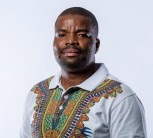This classification map shows the different types of plants in a crop field in various areas in Gauteng. The legend shows red for weeds, green for maize and yellow for mixed growth areas.
Prof Abel Ramoelo, Prof Moses Cho and Yoliswa Mkhize
October 9, 2024

Professor Abel Ramoelo completed his undergraduate studies at the University of Venda in Thohoyandou. He collaborated on research with the University of Pretoria (UP) as an extraordinary lecturer two years before he was employed as a staff member in 2021.
He says he conducts research at UP because the University has high-end laboratories and relevant research equipment, and creates an environment that enables researchers to thrive.
“Earth is in a triple planetary crisis, with serious problems that include biodiversity loss, climate change and pollution,” Prof Ramoelo says. “Interdisciplinary, multidisciplinary and transdisciplinary research is needed to respond to this.”
He is leading research on using Earth observation tools to understand environmental health and agricultural landscapes. His research will aid environmental challenges through the use of assessment and monitoring geospatial tools, such as Earth observation, remote-sensing and geographic information systems; these enable him to work at the interface of various fields of disciplines.
In terms of cross-faculty work, Prof Ramoelo and his co-researchers are contributing to the One Health initiative of the faculties of Health Sciences, Veterinary Science, and Humanities. They have submitted several proposals and are hoping for a positive response.
“My contribution is to quantify environmental health and its changes using Earth observation (EO), and explore how that influences the spread of diseases and their impact on humans and animals,” he explains.
Prof Ramoelo says most of his research activities moved from testing the applicability of remote sensing in quantifying environmental or agricultural variables to applying the tools through the lenses of multidisciplinarity and transdisciplinarity to derive impactful solutions for society.
“In the biodiversity area of research, we are looking at the use of multi-scale remote-sensing data to detect individual trees and species diversity in the Miombo forests; grass species diversity and richness in the grasslands; and biodiversity loss in various biomes,” he explains.
“In the climate change adaptation research area, with the Council for Scientific and Industrial Research’s (CSIR) Holistic Climate Change Group, the focus is on climate change adaptation through the lens of the water-energy-food (WEF) nexus. Here, we are using remote-sensing-derived variables and other environmental data sets to prioritise areas of climate change adaptation interventions. With collaborators from the Future Africa Institute (ARUA Sustainable Food Systems), we are looking at the WEF nexus and food systems, with a gender focus, too.”
Precision agriculture is another area they are focusing on, with collaborators from UP, the CSIR, the Agricultural Research Council and others.
“We are developing EO-based variables such as nutrients, water use, soil moisture, weeds and diseases, which are important for target fertiliser applications, irrigation, weed and disease eradication. In the rangeland assessment research area, we are pursuing cutting-edge research on the estimation of nutrients on forage resources for livestock and wild animals, and how they change over time. These are important variables for sustainable land management. With support from UP, we acquired high-end drone sensors that are crucial for high-resolution mapping, and for calibrating and validating satellite remote-sensing data. We are now opening new avenues for cutting-edge remote-sensing applications in various sectors.”
Prof Ramoelo says the Think Tank initiative of UP’s Faculty of Natural and Agricultural Sciences inspired his quest to pursue multidisciplinary research.
“This initiative enabled me to share knowledge and experiences with my faculty colleagues while identifying potential areas of collaboration. I attended an initiative on sustainability science and biodiversity. There are some interesting research opportunities emerging from it.”
His former PhD promoter, Prof Andrew Skidmore, is one of his role models. Prof Ramoelo describes him as diligent, smart, internationally renowned and highly accomplished in remote sensing and its application in biodiversity. Prof Skidmore promoted most of the top remote-sensing researchers in Africa and elsewhere.
“He inspired me to continue working on multi-scale remote-sensing data while training more aspiring young and emerging researchers,” Prof Ramoelo says.
“In Africa, Prof Moses Azong Cho has been my other role model as well as my colleague, brother and friend. He started his career as a teacher and is now a chief scientist at the CSIR, and an extraordinary professor at UP. He is one of my top collaborators, which can also be seen in the number of scientific papers we have published together.”
Prof Ramoelo hopes to develop EO-based decision-support tools in collaboration with municipalities, provincial and national departments, and industry partners in various sectors. He wants to quantify the number of lives saved, jobs created or livelihoods improved, and the number of sustainability initiatives implemented through the use of these tools.
Why does his research matter? “Someone once said: ‘We cannot manage what we cannot measure,’ and that is true even today,” Prof Ramoelo says. “Information is an integral enabler for improved decision-making processes. The development of EO-based environmental assessment and monitoring tools is critical for several sectors. My research has always been done with environmental assessment and monitoring in mind.”
He advises learners who are interested in his field to choose three or more of the following subjects in matric: mathematics, physical science, geography and biology (life sciences). These, he says, will open doors and opportunities to pursue a geoinformatics or EO-related career. He adds that learners and undergraduates who are interested in geoinformatics must note that it is “an ever-evolving field of study that keeps one on one’s toes, but in the process, it is a fun and interesting field”.
“Come one, come all – we are waiting,” he adds.
As for hobbies, Prof Ramoelo enjoys jogging, keeping up to date with current affairs, watching movies and singing in the church choir.

Professor Moses Cho became part of the University of Pretoria’s (UP) research community in 2016 when he was appointed as an extraordinary professor. He obtained his first degree in natural sciences from the University of Yaoundé in Cameroon, followed by an MSc degree from the University of Greenwich in the UK. His PhD was jointly conferred by the Netherlands-based International Institute for Geo-Information Science and Earth Observation, and Wageningen University.
Prof Cho says he conducts research at UP because it provides an enabling environment for collaboration with colleagues in his field and the supervision of postgraduate students. It also enables him to make significant contributions to the science of remote sensing, his area of specialisation.
His field of research contributes to the betterment of the world because it plays a crucial role in monitoring the impact of land use change on biodiversity and agricultural landscapes, particularly in the context of climate change. It involves utilising both airborne and spaceborne remote-sensing instruments to map landscape properties, especially in vegetated landscapes.
Within his academic discipline, Prof Cho is a leading researcher in the remote sensing of vegetated landscapes in Africa. He has served as president of the African Association of Landscape Ecology and currently heads the Precision Agricultural Research Group at the Council for Scientific and Industrial Research (CSIR).
He is also involved in several cross-faculty research initiatives, including the NEOFrontiers and Bioscape project, which focuses on developing remote-sensing capabilities to map and monitor biodiversity in the Greater Cape Floristic Region, in collaboration with various departments and external partners, including NASA. This research utilises imaging spectrometers to map the rich biodiversity of the Western Cape.
A recent milestone in his research work is the development of methodologies for biodiversity assessment in Southern African landscapes.
As for who inspires his research, he says: “Charles Darwin’s principles of the struggle for existence and survival of the fittest continue to inspire my research, guiding my approach towards safeguarding the environment.”
His academic role model is Prof Andrew Skidmore, who supervised his PhD. Prof Skidmore is the remote-sensing taskforce lead for the Group on Earth Observations Biodiversity Observation Network and the Science Advisory Committee for the European Space Agency hyperspectral CHIME satellite. He has worked at the University Twente as well as Macquarie University in Sydney, Australia.
“His mentorship has shaped my skills in formulating scientific ideas and effectively communicating them through publications and presentations,” Prof Cho says.
His dream is to transform how we monitor our environment, ensuring that everyone has access to real-time information and can act on changes in their immediate environment.
“In this way, our joined efforts will safeguard the future of our planet,” he says.
Prof Cho’s research matters because it provides the necessary data and information for evidence-based decision-making in environmental management.
He encourages aspiring researchers in his field to learn new data analytic technologies including machine learning and artificial intelligence, develop a passion for science, and be proactive in addressing environmental challenges.
When he has time, Prof Cho engages in community development initiatives, and enjoys sport, good food and dancing.

Yoliswa Mkhize completed her undergraduate studies at the University of KwaZulu-Natal, and has been doing research at the University of Pretoria (UP) for just over a year.
She chose to conduct her research at UP because of its strong relationships with leading innovative organisations, such as the Council for Scientific and Industrial Research (CSIR), where she works.
“This collaboration provides a rich environment for advancing cutting-edge research in precision agriculture,” she says. “Furthermore, the University's commitment to producing well-rounded, creative graduates who are responsible, productive citizens and future leaders aligns with my personal and professional goals. My research, which focuses on offering timely, accurate and affordable solutions, embodies this innovative spirit and aims to make a significant impact in the field of precision agriculture.”
Her research in precision agriculture, specifically in weed detection, contributes to the betterment of the world by promoting more sustainable and efficient farming practices.
“By precisely identifying and targeting weeds, we can reduce the need for broad-spectrum herbicide applications, which decreases environmental pollution and preserves soil health,” Mkhize explains. “This approach not only enhances crop yields and agricultural productivity, but also supports long-term food security and reduces the ecological impact of farming, ultimately contributing to a more sustainable and resilient agricultural system.”
Her research matters because it offers solutions to one of the greatest fears of the foreseeable future: food insecurity and, by extension, unemployment.
Mkhize is part of the precision agriculture research team at the CSIR which conducts cross-group research. Weed detection is one of the group’s primary activities as its work may help farmers to maintain as much of their yields as possible.
“My supervisor at the CSIR, Dr Sabelo Madonsela, and myself planned and cemented the research ideas,” Mkhize says. “I then worked with Professors Moses Cho and Abel Ramoelo with analysis and technical skills.”
A recent highlight of her research was the discovery that weed detection can be mapped using biomass during the crucial early-growth stage of maize. This idea has the potential to be expanded to other crops, thus opening up the opportunity to do more work and possibly offering solutions for a wider range of crops.
Mkhize’s academic role model is Prof Cho because of his “openness to share not only his journey as a researcher but how his life and life lessons have influenced who he is”. She adds that this has enabled him to come up with ideas and solutions in areas of his life like his research, status and reputation.
She hopes to find solutions that have an impact on the lives of farmers, employees and the crop agriculture field at large.
“I want to acquire as much skill as possible in geoinformatics so that I can offer cutting-edge solutions.”
To school learners and undergraduates who are interested in her field, Mkhize says: “Open your mind and stay creative. However, work hard, as this will open up opportunities for you. More and more technological advancements are being accessed, which accelerates the rate of methodology development, so look around to determine where the industry is heading and how you can use this to bring change to agriculture.”
She enjoys writing, doing exercise and listening to music, and is interested in mental health improvement, data analysis and gardening.
 Story
Story
University of Pretoria (UP) researchers have found that the antioxidant content of certain types of tea can be likened to that found in recommended portions of fruit and vegetables.
 Infographic
Infographic
Half a cup of black tea, oolong tea or green tea contained the same amount of antioxidants with radical scavenging capabilities (RSC) as that of a 200mg vitamin C tablet.
 Story
Story
Researchers at the University of Pretoria (UP) may have identified the gene that is responsible for diet-related obesity. By exploring the role of the novel gene Slc7a8, they have made a potential breakthrough in current knowledge about the cellular mechanisms that drive fat accumulation. This understanding is crucial in developing effective treatments.
Copyright © University of Pretoria 2025. All rights reserved.
Get Social With Us
Download the UP Mobile App